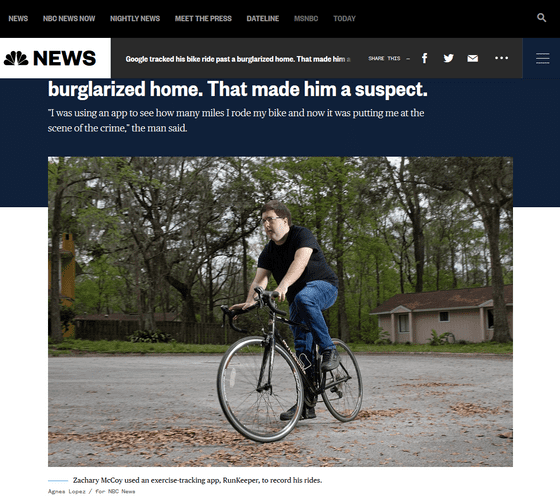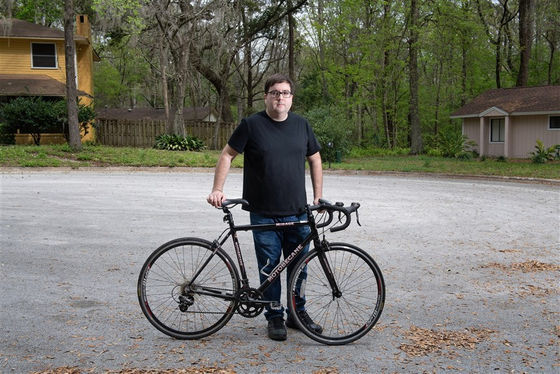Why did a man 'just passed a bicycle' pass in front of a house where a burglar broke out?

In a burglary incident that occurred in Florida, USA in March 2019, a man who had just run a bicycle in front of the victim's home was about to be arrested and misapprehended by police as a suspect. The allegations raised by the man were subsequently resolved, but at the time of writing the article the true culprit had not been caught yet.
Google tracked his bike ride past a burglarized home.That made him a suspect.

Google location data turned a random biker into a burglary suspect-The Verge
Bicyclist Becomes Robbery Suspect Due To His Android Location Data Placing Him At The Scene | HotHardware
https://hothardware.com/news/google-geofence-warrant-privacy-scare
Police issue warrant for innocent man's Google information | Daily Mail Online
https://www.dailymail.co.uk/news/article-8086095/Police-issue-warrant-innocent-mans-Google-information.html
The case where Zachary McCoy, a restaurant employee in Gainesville, Florida, was suspected of burglary originated when a 97-year-old woman living in the area was damaged by burglary . In late March 2019, the woman noticed that she had lost $ 2,000 worth of money, including her wedding ring, from her house, and filed a report with the local Gainesville Police. Four days after reporting the incident, Gainesville Police went to the Alachua County Courthouse, which controls Gainesville, to obtain a search warrant against Google and obtain location information around the victim's home.
Based on the record submitted by Google, Gainesville Police analyzed suspicious movement around the victim's house, and on March 29, 2019, a smartphone was thought to have caused a burglar, and one smartphone It turned out that he had visited three times an hour. The Gainesville Police asked Google for information about the identity of the owner of the smartphone. In response to this, Google's legal team notified Mr. McCoy on January 14, 2020, `` If you do not come to court within 7 days and defend, you will disclose your identity to the police '' .

by Agnes Lopez
Mr. McCoy, unfamiliar to himself, was amazed at the sudden notice and consulted with nearby parents. The parents hired their savings and hired a lawyer with the money they had elaborated, stopped Google's disclosure, and identified what caused the record. As a result, based on a ``
McCoy has been cycling for a long time, and on March 29, 2019, Runkeeper recorded a record of three cycling trips, including around the victim's house. So McCoy's lawyer showed Runkeeper's record to Gainesville Police, who dropped his claim for McCoy. However, Gainesville Police only said that 'information was found indicating that Mr. McCoy was not the culprit,' but did not disclose the reason for the withdrawal.

Mr. McCoy recalled that he was just before his arrest, 'I was indicted without knowing anything and was really terrified.' Mr. McCoy was always cautious about privacy, such as acquiring a Google account with a pseudonym in the custom of the time when using the Internet with his real name was not common, but he agreed with `` Google's collection of location information '' He did not notice at all what he had done.
According to a survey by the U.S. news media NBC News, the number of geofence warrants sent to Google from police agencies, including the FBI, surged 16-fold from 2017 to 2018. It is said that it has increased six times from 2018 to 2019. Calbe Kenyon, McCoy's lawyer, claims that the search for such a geofence warrant is a violation of the Constitution's privacy.
There has been lively debate about whether or not police agencies should obtain the location information of citizens who have not been determined as culprits from Google.
Police ask Google to provide user's location information as `` for searching for suspects ''-gigazine

by Downing Street
In response, Google announced a policy in February 2020 to increase restrictions on apps that collect location information. Meanwhile, bipartisan lawmakers led by Senator Lindsay Gram are promoting legislation to regulate end-to-end encryption by IT companies for the purpose of preventing the flooding of child pornography on SNS, etc. The debate over privacy is heating up.
Mr. McCoy's allegations have been safely resolved, but Kenyon said, 'The major issues related to the geofence warrant and privacy have not been solved.The way of a geofence warrant that seeks to catch a thief and rushes to the Internet. Is a science fiction movie depicting a dystopian society with a powerful government. '
According to NBC News, no one has been arrested in the burglary case at the time of writing. 'It's really a shame what happened to the elderly woman, and I'm glad that police are working on a solution. It also seems to be blindly throwing the net, why is it cost-effective and how much more innocent should be tormented? ' Questioned the typical search method.
Related Posts:
in Mobile, Software, Web Service, Posted by log1l_ks







